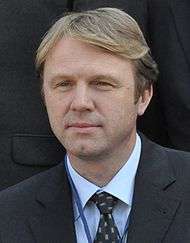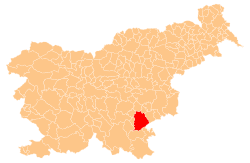Gregor Golobič
Gregor Golobič (born January 20, 1964) is a Slovenian politician.[1] Between 2007 and 2012 he was president of the left liberal party Zares and between November 2008 and June 2011, he served as Minister for Science and Higher Education of Slovenia.
Gregor Golobič | |
|---|---|
 Gregor Golobič on May 8, 2010 | |
| Personal details | |
| Born | January 20, 1964 Novo Mesto, Socialist Republic of Slovenia, Yugoslavia |
| Political party | Zares |
Life
Golobič was born in the Slovenian town of Novo Mesto, then in former Yugoslavia. He attended the Novo Mesto Grammar School. He enrolled at the University of Ljubljana, where he studied philosophy. In 1988, already as a student, he became employed by the Alliance of Socialist Youth of Slovenia, the youth organization of the League of Communists of Slovenia. Between 1992 and 2001, he served as the Secretary-General of the ruling Liberal Democracy of Slovenia.
In 2001 Golobič left politics. In 2002 he obtained his BA in philosophy from the University of Ljubljana with a thesis on a Lacanian critique of the philosophy of Cratylus. In 2006 he quit his former party and in October 2007, he was elected president of the newly formed party Zares, formed mostly by former members of the Liberal Democracy. In the 2008 parliamentary elections he was elected in the Slovenian National Assembly. In November of the same year, he was appointed Minister for Higher Education, Science and Technology in the centre left government of Borut Pahor. At the ministry, József Györkös served as a state secretary.
On April 21, 2011, he announced his resignation as Minister due to disagreements with the policies of the Prime Minister Borut Pahor.[2] In June 2011, Golobič resigned from his position as Minister of Education.[3] His resignation was followed by other ministers of the Zares party later in the same month,[4] opening a government crisis, which was resolved in September 2011 with the vote of no confidence to Borut Pahor and the calling of early elections in December 2011.[5]
In February 2012, he was replaced by Pavel Gantar as the president of Zares.[6]
Controversies
In June 2009, Golobič was involved in a so-called Ultra scandal named after the Slovenian IT company Ultra, where Golobič was employed between 2003 and 2007. He was accused of misleading the media about his investment into that company during the campaign for the 2008 parliamentary election. According to allegations, the company had some 21 million euro of unsecured loans at the state-owned Nova Ljubljanska Banka (NLB). When the media examined the loans, it came out that Golobič owns 10% of Ultra SUM, a Netherlands-based company which owns 70% of Ultra company. This was a fact that he had withheld from the public during the 2008 general election campaign. Golobič publicly apologized for having misled the public, but refused to resign as the minister of Higher Education, Science and Technology [7] The Ultra Scandal was also one of the reasons for the decision of Matej Lahovnik, one of the co-founders of the party Zares, to leave the party in July 2010. Lahovnik, at the time Minister of Economy, mentioned Golobič's alleged misuse of political influence in order to favor his business partners as one of the reasons for his break with the party.[8] As a response, Golobič demanded that Lahovnik stepped down from his position of Minister of Economy and qualified his behavior as "Brutus-like", that is, treacherous.[9]
Golobič is a close personal friend of the Slovenian Marxist philosopher Slavoj Žižek who frequently expressed admiration for him, once referring to Golobič as the "Slovenian Stalin".[10][11] The epithet "Slovenian Stalin" has been frequently used since, mostly by his political opponents and the media.[12][13]
References
| Wikimedia Commons has media related to Gregor Golobič. |
- Zares party website - Presidential page
- "Ostati, oditi, pred referendumom ali po njem? Golobič se je odločil, stranka še ne. :: Prvi interaktivni multimedijski portal, MMC RTV Slovenija". Rtvslo.si. 2010-11-24. Retrieved 2011-10-23.
- D.Labs. "Ministrice odstopile; Zares iz koalicije « Zares". Zares.si. Retrieved 2011-10-23.
- "Borut Pahor odhaja s čela vlade - Planet". Siol.net. 2011-09-20. Retrieved 2011-10-23.
- http://www.rtvslo.si/slovenija/na-celu-zaresa-po-novem-pavel-gantar/276914
- Slovenia Times article Archived 2011-06-14 at the Wayback Machine - July edition, page 6 - retrieved 2009-07-14
- "Lahovnik in Pahor odgovore prelagata na četrtek :: Prvi interaktivni multimedijski portal, MMC RTV Slovenija". Rtvslovenija.si. Retrieved 2011-10-23.
- "Golobič zanika konflikt interesov: Lahovnik ravnal brutalno in brutovsko :: Prvi interaktivni multimedijski portal, MMC RTV Slovenija". Rtvslovenija.si. 2010-04-14. Retrieved 2011-10-23.
- Mladina magazine Archive from 2004
- Lacanian ink event - written by Rebecca Mead
- "Ko slovenski Stalin postane moralna avtoriteta". Demokracija.si. Archived from the original on 2011-10-04. Retrieved 2011-10-23.
- "Kako je Gregor Golobič dokazal, da ni slovenski Stalin «". Razgledi.net. Retrieved 2011-10-23.
